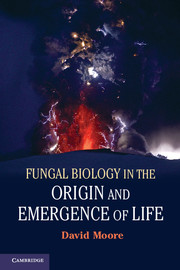Book contents
- Frontmatter
- Contents
- 1 Learning from life on Earth in the present day
- 2 Essentials of fungal cell biology
- 3 First, make a habitat
- 4 The building blocks of life
- 5 An extraterrestrial origin of life?
- 6 Endogenous synthesis of prebiotic organic compounds on the young Earth
- 7 Cooking the recipe for life
- 8 ‘It’s life, Jim . . .’
- 9 Coming alive: what happened and where?
- 10 My name is LUCA
- 11 Towards eukaryotes
- 12 Rise of the fungi
- 13 Emergence of diversity
- References
- Index
13 - Emergence of diversity
Published online by Cambridge University Press: 05 February 2013
- Frontmatter
- Contents
- 1 Learning from life on Earth in the present day
- 2 Essentials of fungal cell biology
- 3 First, make a habitat
- 4 The building blocks of life
- 5 An extraterrestrial origin of life?
- 6 Endogenous synthesis of prebiotic organic compounds on the young Earth
- 7 Cooking the recipe for life
- 8 ‘It’s life, Jim . . .’
- 9 Coming alive: what happened and where?
- 10 My name is LUCA
- 11 Towards eukaryotes
- 12 Rise of the fungi
- 13 Emergence of diversity
- References
- Index
Summary
In the story of life on Earth we have now reached the start of the great spreading out of the eukaryotes, from about 2 billion years ago. This is called the Orosirian Period (2.05 to 1.8 billion years ago). The climate of the Earth at this time is reasonably temperate (the Huronian ice age ended 2.1 billion years ago); the Sun’s luminosity is at about 85% of the present-day level and the day length is about 19 hours (see Table 13.1, located at the end of this chapter). By the end of this period, bacteria are abundant and there has been sufficient prokaryotic photosynthesis for oxygen to start accumulating in the atmosphere. Geologically this is a period of intensive mountain development, which means that there were extensive expanses of terrain above sea level as well as high mountain areas and all the potential habitats that such regions represent. The period was bracketed by two major impact events: the impact 2.02 billion years ago that produced the 300 km meteor crater at Vredefort, South Africa, and the impact of 1.85 billion years ago that formed the 250 km crater at Sudbury, Ontario, Canada (you can find details in the Earth Impact Database at this URL: www.passc.net/EarthImpactDatabase/index.html).
This is the global habitat into which ELCA, the eukaryote last common ancestor, first emerged, still in its biofilm and still surrounded by prokaryotes. Those prokaryotes gave birth to eukaryotes, in the sense that ELCA diverged from a prokaryotic ancestor; but they also compete with ELCA, so to become a success ELCA must immediately compete in the life game and win. By the time ELCA emerged the prokaryotes had had at least 1.5 billion years to diversify and spread themselves throughout the world. The descendants of ELCA will compete with all of these in due time, but at the beginning ELCA was in competition only with local prokaryotes within the biofilm in which it arose. Remember that one of the rules of the life game is that revolutionary advances in evolution take place in small volumes.
- Type
- Chapter
- Information
- Fungal Biology in the Origin and Emergence of Life , pp. 180 - 203Publisher: Cambridge University PressPrint publication year: 2013



